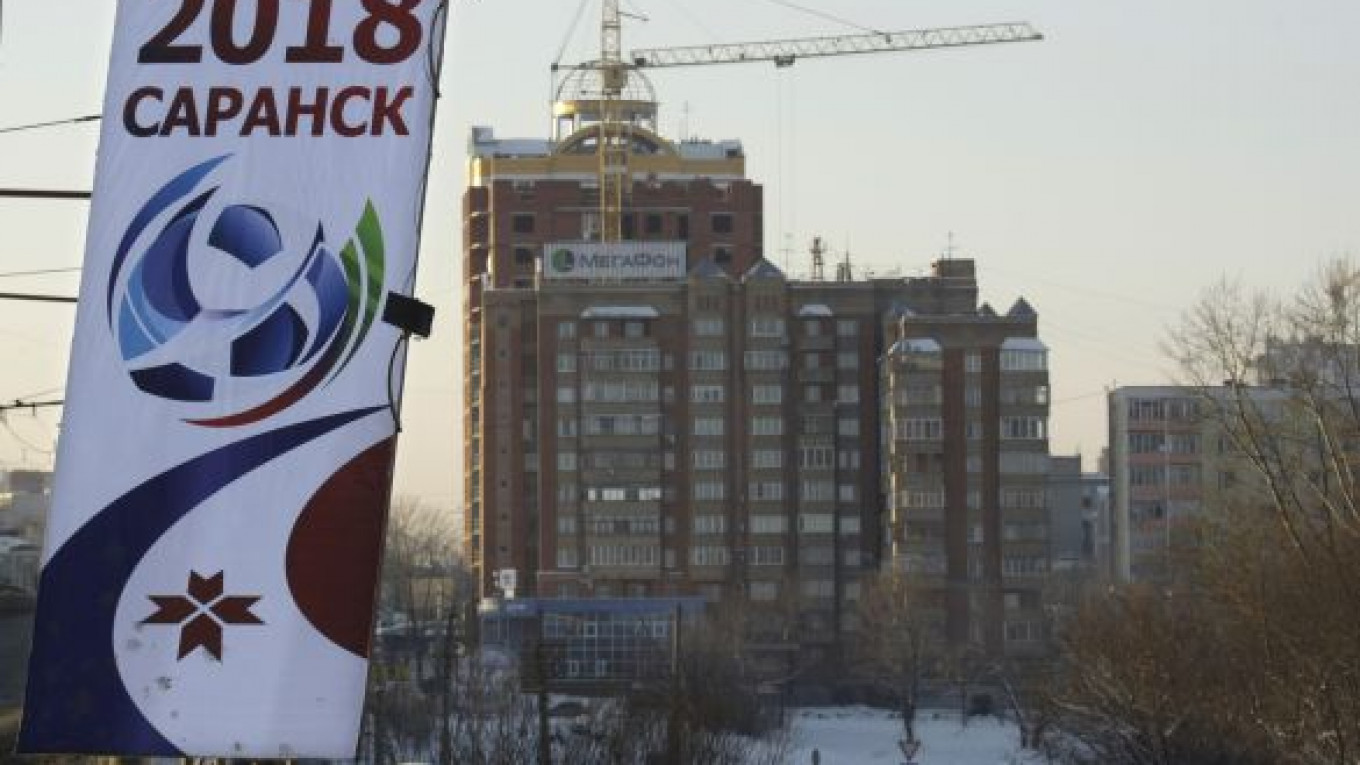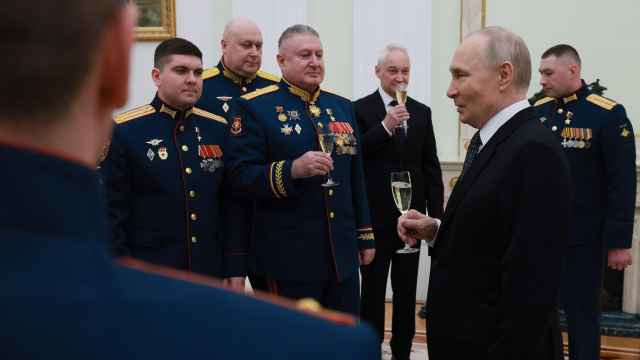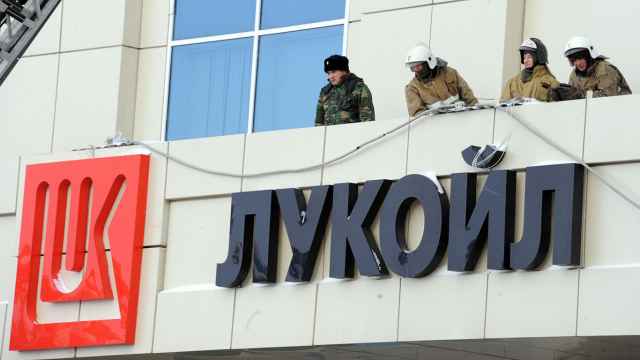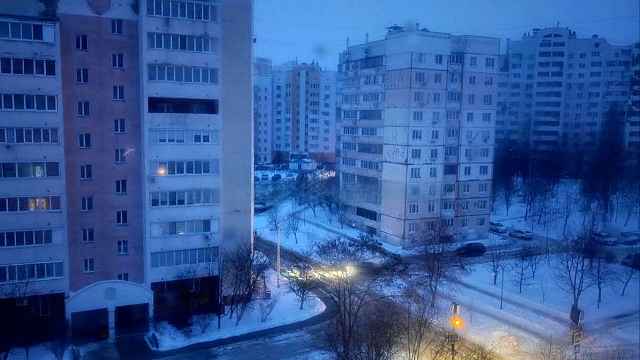SARANSK — Dry snow creaks under the feet of Klara Shishkina as she walks to the frozen Insar River, where a half-built bridge from the opposite bank ends in midair over her wooden gingerbread-style home.
All of the houses in Tambovskaya Ulitsa are to be torn down to make way for the bridge, one of many construction projects aimed at helping this out-of-the-way city welcome tens of thousands of international football fans when Russia hosts 2018 World Cup.
Shishkina, a 51-year-old schoolteacher, is proud that Saransk was among the 13 cities picked. "But why should this be done at my expense? It's like we are back in Stalin's era when you get shot if you refuse to comply," she said.
The choice of Saransk, a tidy town of five-story, Soviet-style concrete apartment blocks, raises a number of questions, including: Why does the biggest sport event on earth need a provincial town of 300,000 people, a good 600 kilometers from Moscow? And, who might be benefiting from the Russian government's decision?
Prime Minister Vladimir Putin has said that Russia will spend at least $10 billion on upgrades to infrastructure in the 13 host cities, with much of the money to come from private companies. The amount of federal budget money has not been specified.
But it's not clear what use Saransk's new, 40,000-seat World Cup stadium will be after the tournament ends. The local football club usually can't fill its current, 14,000-seat facility.
Meanwhile, critics of Governor Nikolai Merkushkin, who has run the Mordovia republic where Saransk is located for 15 years, also claim that he and his family stand to profit from World Cup projects.
A lawyer helping Shishkina fight eviction points to an alternative route for the bridge that would not affect the homes. He claims that a construction firm run by the governor's brother plans to build high rises on the picturesque river bank.
The bridge will link the city with the stadium site, but locals suspect that it is merely a pretext to clear the land from their unsightly houses and leave more space for housing development.
"Everyone in Mordovia knows that there is corruption involved in this construction," said the lawyer, Sergei Serebryakov.
The city's transformation is seen at the city's main hotel. A "second-class" room priced at $30 offers a glimpse into its shabby Soviet past, with a worn-out carpet, noisy refrigerator and two tiny beds. Across the hall, a new standard room going for $100 has all the amenities of a three-star hotel.
Apart from renovation, local authorities are planning to build a dozen new hotels, including two luxury five-star hotels that they expect to be frequented by business travelers after the World Cup.
The local airport, which currently serves a few regional flights a day, will be upgraded at a cost of some 350 million rubles ($11.4 million). At least 12 billion rubles ($390 million) will go toward improving roads in the next three years and 5.5 billion rubles will be spent on the stadium.
Mordovia is counting on federal funds as well as private investment, Merkushkin said in an interview with The Associated Press. That is a lot of money for a region with fewer than 1 million people, where the average monthly salary is only 9,500 rubles ($310). Mordovia has two major factories producing freight cars and containers, but it is predominantly an agricultural region known for its potatoes and milk.
The governor says Saransk is small and will need fewer tickets for the games, leaving more seats available for visitors. The airport is so close to town and the stadium that fans can be whisked to their seats in 25 minutes.
Merkushkin laughed off the suggestion that his relatives would benefit from the World Cup and said his family's business interests have been "blown out of proportion." He said his elder brother does not build roads or stadiums but is involved in housing. "I'd like to ask him to take part in building the hotels, but he is reluctant," the governor said.
The governor promised strict oversight over finances to make the World Cup a success.
"Our goal is not to try to make money, but to go down in history," he said.
Merkushkin's elder brother owns a controlling stake in the main construction company, which receives government contracts. The governor's younger brother is chief executive of a major local oil company, while Merkushkin's son has extensive interests in agriculture and has been accused of using his connection to seize land.
A group of farmers in 2006 leased some 8,800 hectares of abandoned land outside Saransk from four former collective farms. After the farmers had worked for two years to restore the soil, a firm owned by the governor's son seized the land in 2008, according to their lawyer, Failya Makarova. The farmers are fighting the matter in court.
"Like everywhere in Russia, those who break the law feel safe if they have protection high up," Makarova said.
Vladimir Gridin, regional leader of the opposition Yabloko party, said "Mordovia is a feudal state where the police, courts and prosecutors are so closely intertwined that they can do whatever they please to intimidate people who dare to defend their rights."
At the site of the new stadium on a recent wintry afternoon, trucks were leveling the snowy ground in preparation for construction to begin.
Less than 2 kilometers away across the river, about half of the 50 or so houses are now empty. Schoolteacher Shishkina and others say they are unhappy with the property they have been offered for resettlement and are not going to move. But as time goes by, the deals they are offered only get worse.
Shishkina's 68-year-old neighbor, Valentina Bogachyova, who shares a three-room house with her brother, says she was first offered a studio apartment. Now her only option is a room in a dormitory.
Merkushkin said most residents were happy with the resettlement options they were offered and the old houses would have to be pulled down anyway because they will be vulnerable to flooding as a result of housing development nearby.
A Message from The Moscow Times:
Dear readers,
We are facing unprecedented challenges. Russia's Prosecutor General's Office has designated The Moscow Times as an "undesirable" organization, criminalizing our work and putting our staff at risk of prosecution. This follows our earlier unjust labeling as a "foreign agent."
These actions are direct attempts to silence independent journalism in Russia. The authorities claim our work "discredits the decisions of the Russian leadership." We see things differently: we strive to provide accurate, unbiased reporting on Russia.
We, the journalists of The Moscow Times, refuse to be silenced. But to continue our work, we need your help.
Your support, no matter how small, makes a world of difference. If you can, please support us monthly starting from just $2. It's quick to set up, and every contribution makes a significant impact.
By supporting The Moscow Times, you're defending open, independent journalism in the face of repression. Thank you for standing with us.
Remind me later.






